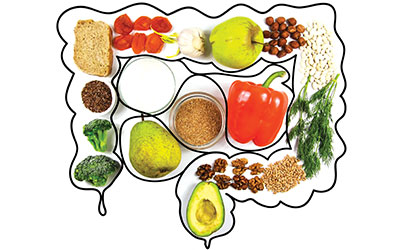The gut i.e, gastrointestinal/digestive tract, plays an essential role in sustaining, protecting and boosting the overall health and wellness of every human being. A healthy gut builds a strong immune system, healthy heart and brain, ensures effective digestion, good sleep and alleviates depression

For years in biology class, school children learnt that there are 11 organ systems in the body — the integumentary (skin), muscular, skeletal, nervous, circulatory, lymphatic, respiratory, endocrine, urinary, reproductive and digestive. Recently, two more important organ systems have been added which focus on the fat around the internal organs (intra-abdominal obesity) and the micro flora (bacteria, viruses, fungi) living in the alimentary canal (commonly ‘gut’).
The gastrointestinal system, aka gastrointestinal tract, digestive system, digestive tract and gut, comprises a group of organs including the mouth, esophagus, stomach, pancreas, liver, gallbladder, small intestine, colon, and rectum. Gut health is essential for sustaining, protecting and ensuring the overall well-being and wellness of the human body. It is vital for building a strong immune system, healthy heart and brain, effective digestion, refreshing sleep and alleviating depression.
 The small intestine of an adult human being is not small at all. It is about 6 metres or 20 ft long and the large intestine 1.5 metres or 5 ft in length. This means there is plenty of room in them for microorganisms to grow. It is also open at both ends so access is easy. That is why there are 200-300 different types of bacteria living in all intestines. To this in-gut population, add numerous viruses and fungi.
The small intestine of an adult human being is not small at all. It is about 6 metres or 20 ft long and the large intestine 1.5 metres or 5 ft in length. This means there is plenty of room in them for microorganisms to grow. It is also open at both ends so access is easy. That is why there are 200-300 different types of bacteria living in all intestines. To this in-gut population, add numerous viruses and fungi.
Every individual’s alimentary canal is colonised with these organisms while she is a foetus in her mother’s uterus. After birth, the growth of these organisms is facilitated by the distinctive composition of mother’s breast milk. These organisms feed on milk and release amino acids, antioxidants and other anti-inflammatory chemicals. This is how breast milk protects newborns against gastrointestinal and viral infections.
Infants born by caesarean operation are delivered in a artificial sterile environment. Therefore the process of colonisation of caesarian babies’ guts is slower. The diversity of the microflora is less and catches up with children born by vaginal delivery after the age of two. If children are fed formula-milk and there is little or no breast milk intake, newborns take even longer to develop gut diversity. Likewise prematurely delivered infants have smaller, immature intestines, which are colonised slowly. Moreover they are less likely to be exclusively breastfed. This contributes to lower immunity and higher morbidity in preterm infants.
Inevitably organisms in the stomach of infants come into contact with the food consumed by them. The amount they ingest, the amino acids released and waste produced, contribute to their overall health. They can make digestion and absorption more efficient. That is why even when two differing individuals eat the same type and amount of food and expend the same amount of energy, one may be obese and the other lean.
Your gut is unique
Each person’s fingerprint is unique. In the same way, each person’s intestinal bacteria are unique. This is partly due to environmental reasons. Intestinal bacteria are greatly influenced by the frequency of breastfeeding, the weaning process and later the family diet and lifestyle. This is why some gut disorders ‘run in families’.
There is also a strong association between intestinal bacteria and insulin resistance. Some bacteria contribute to obesity and later Type 2 diabetes. Food is converted by bacteria into fatty acids which lead to changes in the lipid profile (cholesterol and triglycerides) and can precipitate heart ailments and strokes.
Some gut bacteria reduce inflammation, while others aggravate it. Overgrowth of bad organisms can cause IBS (irritable bowel syndrome), ulcerative colitis and Crohn’s disease. The gut bacteria of people diagnosed with colon cancer is also distinctly different.
The chemicals released by the gut micro flora can enter the blood and travel to the brain. This can cause anxiety and depression.
Improving intestinal health
To maintain good digestive health, it’s advisable to follow diets rich in whole grains, high fibre fruits and vegetables. Food rich in refined sugar can kill good bacteria.
Many people use artificial sweeteners to control diabetes, lose weight and reduce calories. But artificial sweeteners could alter intestinal flora and prompt obesity and insulin resistance.
Probiotics promote the growth of good gut bacteria. People attempt to populate their gut by regularly consuming sachets or capsules of probiotic supplements. But their proven value is doubtful. A better option is to consume 30 ml of homemade yoghurt first thing in the morning on an empty stomach.
Exercise decreases inflammation-causing bacteria and increases good bacteria. To be effective, endurance exercise (continuous aerobic activity) non-stop for 30-40 minutes at least six days a week is recommended.
Meanwhile scientists are working on developing natural intestinal bacteria supplements to reduce the risk of lifestyle diseases such as diabetes, and to aid treatment of arthritis, depression, cancer and neurological diseases such as Parkinson’s.
(Dr. Gita Mathai is a Vellore-based paediatrician and author of Staying Healthy in Modern India)






















